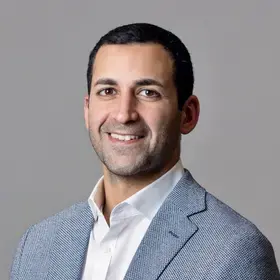Dennis Browne wanted to further develop his knowledge about information management. In his role in the legal department at Capital One, he oversaw, among other things, records retention. He was eager to learn how to apply new technologies and processes in order to better streamline information retention, improve information governance, and drive efficiency at his organization.
He viewed the Information and Knowledge Strategy (IKNS) program as a way to develop new skills and discover the most up-to-date best practices at the intersection of knowledge management and the law.
From his office in Richmond, VA, he spoke with Columbia about his experience in the program, and how he’s using lessons from IKNS as Vice President and Senior Associate General Counsel at Capital One, as well as the leader of the Legal Department’s Technology Community of Practice (TCoP).
What were you doing right before the program, and what compelled you to enroll in the program?
I didn't know what I didn't know about information strategy. Because my responsibilities included intellectual property as well as the company's information retention policy, I thought that I might as well get the latest thinking about this topic. That's initially what drew me to the program. Within a year of starting IKNS, I was promoted to Vice President at Capital One.
In what ways does your role involve knowledge management?
I used to oversee the company's electronic discovery efforts in litigation. One thing that I found again and again was that we were producing and preserving records that probably had no business value and were not essential to efficiently running a company. So we were incurring all this expense and inconvenience for documents that had no relevance. It struck me that having an effective position in information governance could reduce electronic discovery expenses and make a positive impact on the bottom line.
You’re the attorney for Capital One’s mobile payment agreements with hardware companies like Apple, working on introducing digital wallets and other transactions capabilities. Can you tell me about that?
I took part in negotiating the Apple Pay agreement and other agreements with other hardware and software providers like Google. These agreements often focus on what we’re capable of knowing about consumers in data-rich mobile transactions, such as geolocation data, and whether and how the parties to these agreements may use this knowledge. Certain metadata fields are of interest to certain software and hardware providers, and certain ones we were unable to offer, for legal reasons.
As a graduate of IKNS, to whom would you recommend this program?
This program is for young professionals looking to differentiate themselves. In speaking to some of my classmates, they thought about earning an M.B.A. but decided on this instead, and they were glad that they did.
I would recommend the program to those who are on the front lines of dealing with content management, and those who are in the process of developing applications and other tools that rely upon new data sources and the like. It’s also ideal for folks in the legal world who have responsibilities similar to mine in the realm of records retention and data-rich products. They, too, would benefit.
You’re applying your lessons from IKNS as a leader in knowledge management at Capital One. You lead the Legal Department’s Technology Community of Practice (TCoP). Can you tell me how and why that came about?
Our CEO and General Counsel announced an initiative to make our enterprise more digital. Part of that is increasing our fluency in technology in the Legal Department. I proposed this idea of establishing a Technology Community of Practice (TCoP) in Legal. I essentially took plays out of [guest lecturer] Stan Garfield's CoP playbook for how to establish a community of practice. The course Networks and Collaboration (IKNS 4305) added a whole new perspective on leading communities of practice so they are sustainable.
The focus of the technology community of practice is to identify and research new technologies that will make legal associates more efficient or productive. For example, we looked at word clouds, a technology that I learned about in the IKNS program [that finds metadata from text, titles and headings in documents]. We created a use case where we created word clouds of the terms in the claims of the issued patents that we own, and we studied them by year. What were the top terms within the issued claims of issued patents in 2003, versus 2013? For instance, the word "mobile" never showed up in 2003. It's all over what we get patents on now.
Is there an opportunity to leverage word clouds to study the terms that appear in deposition transcripts, or in pending legislation? Those are the sorts of things that we're trying to get folks to think about. I want to help the organization demystify this type of knowledge technology so that the department can become more digitally fluent and more competitive.


